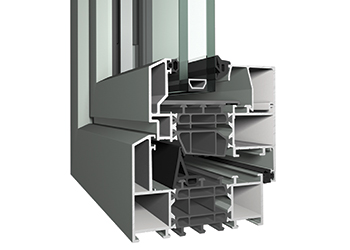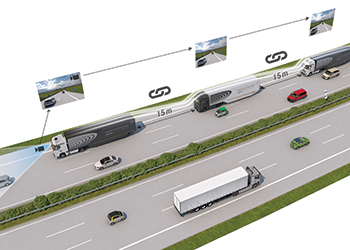
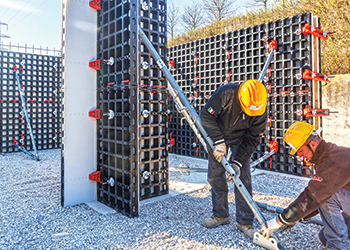 Duo formwork ... is characterised by its low weight and very simple handling.
Duo formwork ... is characterised by its low weight and very simple handling.
Peri, a leading German formwork and scaffolding manufacturer, has successfully developed a new formwork system that uses the benefits of engineered polymer plastics to replace the traditionally used materials such as steel, aluminium and wood.
The vast majority of the components of the new Duo formwork system use a specially developed fibre-reinforced plastic, which is also resistant to moisture-related swelling and shrinkage, and is corrosion-proof and problem-free when coming into contact with concrete. The new system is lightweight and easy to handle but also offers sufficient load-bearing capacity and design flexibility, according to the company.
Tracing the development of the new product, Peri’s MEA (Middle East and Africa) director Jörg Hegestweiler says: “Conventional formwork systems rely on long-proven materials, namely wood, steel and aluminium for their supporting and load-bearing constructions. They still have a role to play and have specific strengths, such as accommodating high loads and large-scale applications, which however is not required for all project types.
“For the new product development, we set ambitious goals. This meant totally rethinking the situation and, in this case, beginning with the material used.
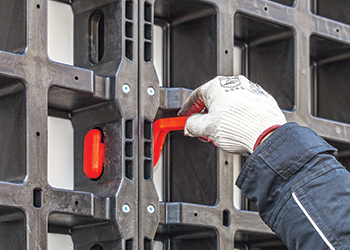 |
|
All work operations with Duo can be carried out without tools. The panels can be utilised for forming walls, columns and slabs. |
“During the development (and for some time previous to this), Peri took into consideration the option of engineering plastics, which allow much greater freedom in the design and, with the correct selection of materials, their physical properties can be tailored very precisely.
“The new Duo features significantly extended fields of application, lightweight design with sufficient load-bearing capacity and simple handling.”
Hegestweiler adds that with the recent product innovation, Peri has proved that more than just minor improvements are possible through a combination of new materials and a new component systematic.
Significant weight savings are achieved as a result of using polymer plastics instead of steel or aluminium.
He says the fact that the components are so light is noticeable in many aspects. “In the first instance, of course, with the handling: no part is heavier than 25 kg, and even two Duo panels connected together for standard wall heights of 270 cm can easily be brought into position by two persons. Lightweight components make the handling easier, reduce the physical strain and the risk of accidents significantly. In terms of transport and logistics, fewer moving masses are involved and no equipment or cranes with high payloads are required – thus reducing energy and equipment costs.”
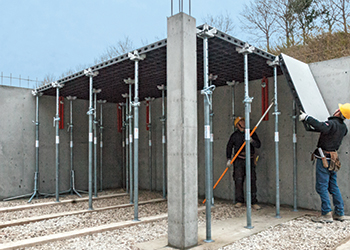 |
|
|
Peri’s aim was to develop individual system components that can be flexibly combined and used for different tasks. This means that with Duo, walls, slabs and columns can be formed using the same components. “For example, there is only one connector for all components, the posts for the external and internal corners are identical, the push-pull prop connector also functions as the connection for the guardrail posts and serves to secure the bracing for the slab formwork,” he remarks.
Consequently, more than two-thirds of all system components can be used for horizontal and vertical applications. The numerous identical parts not only simplify assembly procedures, they also ensure procurement cost and storage space requirements remain considerably lower than is the case of separate formwork systems for walls and slabs.
“Sample invoices show that, with a smaller amount of standard equipment for forming walls, only around 20 per cent more investment is required to also realise slab formwork with the Duo system – including accessories like tie technology, push-pull props and slab props, brackets and guardrails,” Hegestweiler concludes.





















_0001.jpg)


.jpg)
















.jpg)








.jpg)



